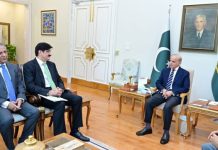WASHINGTON: Pakistan Ambassador to the United States Aizaz Chaudhry remarked that Pakistan intends to consult with the World Bank on the Kishanganga Dam issue.
He was addressing a seminar titled ‘Pakistan and Unites States A Lasting Partnership’.
Speaking in the context of issues pertaining to Islamabad’s eastside neighbour, Chaudhry said the country intends to take up plans of Indus Waters Treaty (alternatively known as the Sindh Taas Agreement), Kishanganga Dam, and Ratle Hydroelectric Plant with Jim Yong Kim, the president of the global financial institution.
The statements come in response to Indian Prime Minister Narendra Modi inaugurating Kishanganga Dam project amid protests from Pakistan, which says the project on a river flowing into Pakistan will disrupt water supplies.
The 330MW Kishanganga hydropower station, work on which started in 2009, is one of the projects that India has fast-tracked in the volatile state amid frosty ties between the nuclear-armed countries.
 “This region cannot only become self-sufficient in power but also produce for other regions of the country,” Modi said in the state´s capital, Srinagar. “Keeping that in mind we have been working on various projects here for the past four years.” Pakistan has opposed some of these projects, saying they violate a World Bank-mediated treaty on the sharing of the Indus River and its tributaries upon which 80 percent of its irrigated agriculture depends.
“This region cannot only become self-sufficient in power but also produce for other regions of the country,” Modi said in the state´s capital, Srinagar. “Keeping that in mind we have been working on various projects here for the past four years.” Pakistan has opposed some of these projects, saying they violate a World Bank-mediated treaty on the sharing of the Indus River and its tributaries upon which 80 percent of its irrigated agriculture depends.
“Pakistan is seriously concerned about the inauguration (of the Kishanganga plant),” its Foreign Ministry said in a statement. “Pakistan believes that the inauguration of the project without the resolution of the dispute is tantamount to violation of the Indus Waters Treaty (IWT)”.
The Kishanganga project was delayed for several years as Pakistan dragged India to the International Court of Arbitration, which ruled in India’s favour in 2013. India has said the hydropower projects underway in Jammu and Kashmir are “run-of-the-river” schemes that use the river’s flow and elevation to generate electricity rather than large reservoirs, and do not contravene the treaty.
US embassy in Jerusalem
While responding to US moving its embassy to Israel from Tel Aviv to Jerusalem, the ambassador reiterated that Pakistan holds reservations on Washington’s decision.
On May 14, the new US embassy to Israel officially opened in Jerusalem as US President Donald Trump has formally recognised the holy city as the country’s capital.
The opening comes after a day of celebratory festivities in Israel juxtaposed with mass protests along the border of Israel that left at least 60 Palestinians dead and more than 1,000 injured—making it one of the bloodiest day of weeks of demonstrations that have cast a cloud over the embassy opening.



